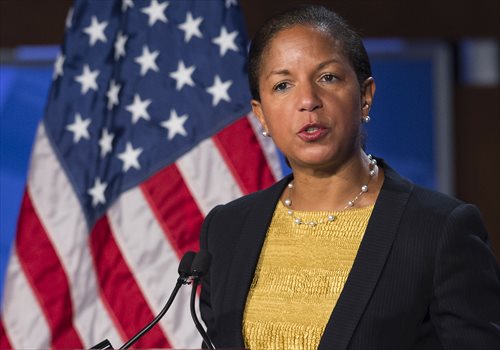HOME >> CHINA
China, US could coexist peacefully: survey
By Yuen Yeuk-laam and Kou Jie Source:Global Times Published: 2015-9-23 1:13:01
45% have a positive future outlook, 60% see US as biggest competitor

US National Security Adviser Susan Rice speaks about the US-China relationship and upcoming Chinese state visit at George Washington University in Washington, DC on Monday. Photo: AFP
More than 78.5 percent of the respondents said "China and the US could coexist peacefully, and could benefit each other," a Global Times poll released Monday found.
In the meantime, only some 15 percent held an opposite view.
The survey, conducted by the Global Times Poll Center from September 17 to 20, interviewed 1,520 Chinese residents over the age of 18 in seven cities - Beijing, Shanghai, Guangzhou in South China's Guangdong Province, Changsha in Central China's Hunan Province, Chengdu in Southwest China's Sichuan Province, Xi'an in Northwest China's Shaanxi Province and Shenyang in Northeast China's Liaoning Province.

Graphics: GT Source: Global Poll
About 55 percent of the Chinese people paid close attention to President Xi Jinping's US trip, which began on Tuesday, with the future development of the Sino-US ties topping concerns surrounding the visit.Among them, about 22 percent said they were highly concerned about the visit.
About 51 percent of all the respondents are concerned about "the future of the Sino-US relations," which topped popular concerns about the visit. About 40 percent showed their interest in "the dispute over East and South China seas," while 24 percent are concerned with the "Taiwan question." The remaining concerns include Sino-US bilateral investment treaty negotiations, cyberspace security and anti-terrorism.
"Most of the Chinese people are very concerned about the Sino-US ties since China used to be ravaged by powerful nations [before the founding of the People's Republic of China in 1949] and Chinese people are therefore more sensitive to international affairs," Zha Xiaogang, a research fellow at the Shanghai Institute for Internstional Studies, told the Global Times.
It is also because China has a close relationship with the world power, Zha added.
He said it is understandable that the future development of the bilateral relations topped the concerns, considering that Sino-US relations are no longer an abstract issue and it is closely associated with many aspects of Chinese people's life such as the economy and culture.
However, Wang Yiwei, director of the Institute of International Affairs at the Renmin University of China, argued that 55 percent is not a high percentage since the influence exerted on China by the US has not been as great as that of the past.
When asked about "the general view of the US," 40.8 percent of the respondents held a positive view, but some 45 percent were left with a negative impression.
In contrast, a similar poll conducted by the Washington DC-based Pew Research Center found that some 54 percent of Americans had a favorable impression of China, with only 38 percent of them disliking China.
"Some Chinese people dislike the US because of its undue interference in disputes over the East and South China seas. Also, the US-Japan alliance and their security treaties have been disturbing some people," Zha said.
The poll also found that 60 percent of Chinese people believed that the US is China's biggest competitor in the international community, with Japan ranking second with 18.8 percent.
Some 35 percent of the interviewees believed that "the US will contain China, preventing it from becoming a super power." Only 5.4 percent thought that "the US will accept China as a powerful country akin to the US."
About 60 percent of respondents believed that "China's growing military power" posed a great threat to Sino-US relations, while 54.7 percent thought that "the US trade deficit with China" would harm bilateral relations.
China's strengthened military power makes Chinese people proud and worried at the same time, concerned that the US might take measures to curb China's rise, Zha said.
A similar poll conducted by the Pew Research Center showed that the large amount of US debt being held by China and the loss of US jobs to Chinese were the biggest obstacles to Sino-US relations.
Jin Canrong, a deputy dean at the School of International Studies at Renmin University of China, in Beijing, told the Global Times that the results demonstrate that the American people are generally more concerned about their domestic problems.
"Unemployment is a big issue in the US. Coupled with media's negative reports on China, Americans can easily associate China with their economic problems," Zha explained.
About 45 percent of the surveyed respondents envision a bright prospect for the medium- and long-term development of Sino-US relations. Only 7.3 percent believed the bilateral relations would worsen in the future.
The poll indicated that Chinese people generally have an objective understanding of the bilateral ties since the US and China have frequent cooperation, Zha said, adding that it is unlikely for two nations to have military conflict.
Posted in: Diplomacy